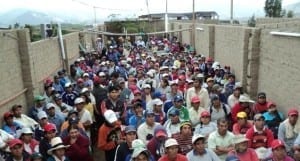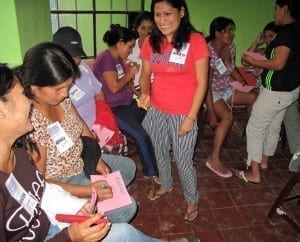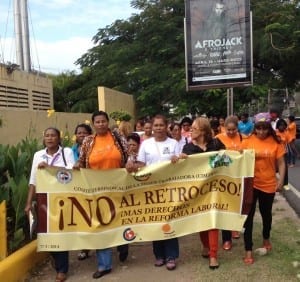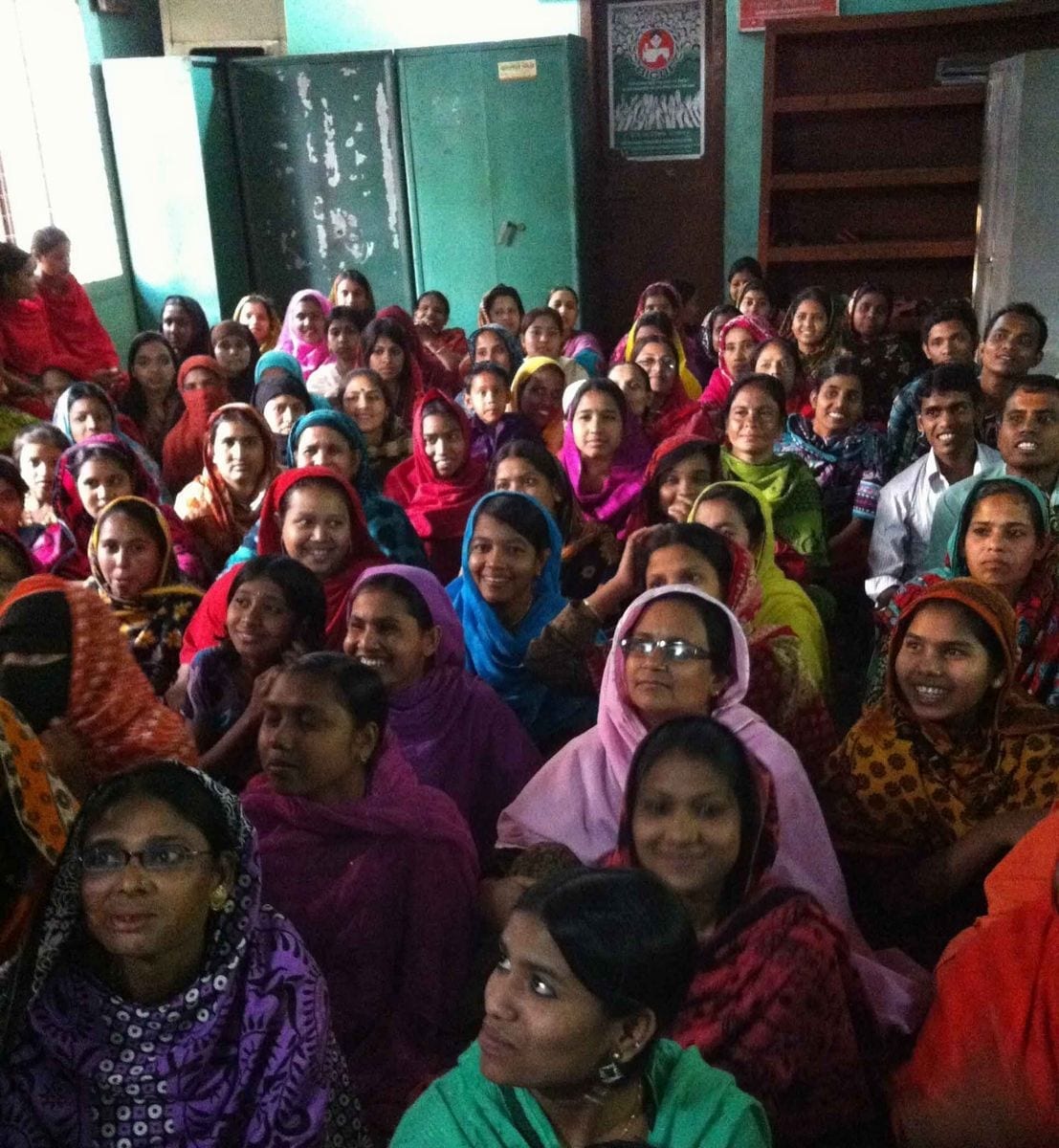Mar 14, 2014

Camposol employees at a company assembly. Credit: Solidarity Center
Eighteen agricultural workers in Peru were detained during a work stoppage as they protested an agro-industrial company’s failure to uphold its collective bargaining agreement, according to the Camposol Workers’ Union (SITECASA). One union leader, Carmen Silvestre Rodríguez, was beaten by the national police, and the union’s general secretary, Felipé Arteaga, has been arrested, the union said.
SITECASA members began a peaceful work stoppage March 12 at the company’s facilities in Chao, a town in the country’s northern region. They are seeking the company’s compliance with several provisions in the region–wide collective bargaining agreement reached in July 2013, including resolution of daily production quotas for field workers, payment of annual profit sharing and provision of proper uniforms, footwear and meals for workers.
Field workers, who harvest avocados, mandarin oranges, mangoes and blueberries for export, currently must harvest 60 pallets before they receive their minimum daily wage of $11. According to the union, Camposol has conditioned its willingness to negotiate these points on the union’s retraction of an article in the collective bargaining agreement that provides employment stability (an indefinite contract) for workers with four years working for the company.
Camposol S.A. is Peru’s largest producer and exporter of non-traditional horticultural products like asparagus. Approximately 14,000 workers labor on Camposol’s vast plantations throughout the country. In 2012, the U.S. Department of State’s Human Rights Report cited Camposol for interfering with workers’ right to strike after the company failed to reinstate 250 workers dismissed for participating in a strike during collective bargaining.
Read the union’s full statement (Spanish).
Mar 10, 2014

Violeta co-facilitated a workshop after learning skills from a Solidarity Center-sponsiored training. Credit: Samantha Tate
Rosa Pérez was brought to Lima, Peru, from the country’s Northern Sierra when she was a child to work as a domestic worker. As a young adult, she moved to the farming region of La Libertad to make her own way as an agricultural laborer. Thirty years, four children and five grandkids later, Perez has become a bold advocate for her co-workers. She encourages them to document and speak out about problems such as sexual harassment and inadequate safety and protection equipment and training.
Pérez, secretary of Women’s, Child and Adolescent Affairs of the Camposal Workers’ Union (Sindicato de Trabajadores de la Empresa Camposal), is a leader in a Solidarity Center program to empower women farm workers in Peru. Since 2009, the program, which includes the National Federation of Farm Workers (Federación Nacional de Trabajadores de la Agroindustria y Afines, FENTAGRO), has involved training and advocacy activities with unions representing workers in export-oriented agriculture.
The initiative gained momentum after Pérez traveled to São Paulo, Brazil, last year to participate in the Solidarity Center conference, “Women’s Empowerment, Gender Equality and Labor Rights: Transforming the Terrain.” There, she addressed more than 100 women from around the world and described working conditions for women farm workers in Peru and the actions that her union and FENTAGRO are taking to build a better life for women like her daughter, who works alongside her.
Pérez took the strategies she learned from activists at the conference to the farm worker federation’s leadership Friday, the eve of International Women’s Day. Along with the Solidarity Center, Pérez is recommending that La Libertad’s three unions meet with regional government officials and possibly employers to advocate for literacy programs targeting working women. She also plans to propose an awareness-raising campaign for men and women about sharing domestic and family care. The Solidarity Center has also been working with unions to strengthen their arguments for collective bargaining with employers in support of maternity and breastfeeding benefits that are codified in Peruvian law but not generally enforced.
Following the Women’s Empowerment conference, Perez worked with the Solidarity Center to identify 12 dynamic women from three export-oriented agriculture farms to take part in a Solidarity Center training this year geared toward building women’s confidence and strengthening their leadership skills so they can effectively advocate for women workers’ issues within their unions, their workplaces and their communities.
One of the workers who joined the training, Apolonia, is an elected officer in the Union of Agrícola Viru Workers (Sindicato de Trabajadores de la Empresa Sociedad Agrícola Virú, SITESAV). She grows and harvest fruits and vegetables as part of Peru’s export-agriculture industry, which, in 2013, generated $33 million in exports to the United States. She advises her fellow co-workers, especially young women, about how to stay healthy and build strong families while working between 12 hours and 14 hours a day and earning an average daily wage of $12.
Apolonia and other participants in the two-day training discussed how they can improve workplace safety and other issues and shared their dreams about bettering their workplaces, unions and households.
Two weeks after the leadership training, nearly all of the women who participated in the workshop, including Violeta and María Luna, who had been reluctant to speak in public, co-facilitated small workshops with groups of their peers using the new techniques they learned from the Solidarity Center training, including public speaking and one-on-one-contact to encourage self-confidence and participation.
The La Libertad network of women farm workers now has a compact disk with the stories of 32 Peruvian women leaders they can share in small study circles or at worker assemblies and when training other groups of women. It is the beginning of a much longer process that already has helped a group of powerful women to find their voice and begin to use it.
Mar 7, 2014

Oretha Tarnue, vice president of the United Workers Union of Liberia (UWUL). Credit: Tula Connell/Solidarity Center
Each day this week leading up to International Women’s Day March 8, the Solidarity Center will highlight an example of how women and their unions are taking action to improve women’s lives on the job, in their unions and in their communities.
Oretha Tarnue, vice president of the United Workers Union of Liberia (UWUL) and a former domestic worker, is spearheading a drive in her country to organize domestic workers who, like their counterparts elsewhere, are routinely exploited by their employers.
In Liberia and in other countries, the overwhelming majority of domestic workers are young women who view the work as an opportunity to earn a living, but too often find themselves vulnerable to abuses—from low wages and long hours to physical and sexual abuse and human trafficking.
Tarnue, who is also a lead coordinator for the Domestic Workers Union of Liberia (DOWUL), says the workers, mostly women, are paid between $21 and $50 per month, which is barely enough to buy a bag of rice. The country’s minimum wage is $2 a day.
Solidarity Center staff spoke with Tarnue about the challenges involved in connecting with domestic workers to help them understand their rights as workers, join together to improve their working conditions and convey to lawmakers and the public that domestic workers perform real work, and have the same rights as and deserve labor law coverage equal to all other wage earners.
Solidarity Center: How did you get involved with the domestic worker union?
Tarnue: I thought there was a need to organize domestic workers. I have worked as a domestic worker and in our labor laws, domestic workers are not (recognized). We went from home to home and other places, like hotels, where domestic workers are not recognized, and we began to talk to people. (With) the Solidarity Center and the United Steelworkers (USW), we had a training where we selected domestic workers from different communities. We had a good training that led those coordinators to go out and organize and recruit members.
Solidarity Center: What was your experience as a domestic worker?
Tarnue: There’s no scope of work, there’s no term of reference. Domestic workers’ contract is a verbal contract and domestic workers are not (recognized) under the labor law so they are at the discretion of the boss.
Solidarity Center: How do you reach out to domestic workers?
Tarnue: We go out and speak to workers at their workplaces or meet them during their breaks of off hours. We are able to teach them at the level they’ll understand. Teach them their human rights, their physical rights, their moral rights. The basis of our training to domestic workers is to know their rights as human beings. They are entitled to their human rights, and we teach these things to them.
Solidarity Center: Has all this made a difference?
Tarnue: It has made a difference because, as we speak, our 30 coordinators (who are domestic workers) have been able to (challenge) their own bosses.
Solidarity Center: Really?
Tarnue: Yes. Their own bosses! This comes from the Solidarity Center and USW training! We tell them to not be violent, not be rude, but you can peacefully engage your boss. Access the boss’s’ leisure time and discuss issues relating to work time, to terms of reference, scope of work, wages. Lay them down one at a time and go into discussion. These 30 coordinators have been able to increase their wages just by having a discussion with their bosses. This lets us know that the training has been working.
Solidarity Center: In the next five years, what do you envision for DOWUL?
Tarnue: We are 100 percent optimistic that domestic workers are going to be fully unionized and (added) into Liberia labor law and a collective bargaining agreement is going to be done for the domestic workers. That’s our hope because domestic workers are like any other workers. They should be treated like any other worker on Liberian soil.
Mar 7, 2014

Dominican Republic workers rallied on the eve of International Women’s Day. Credit: Geoff Herzog
Chanting, “No to Labor Code rollbacks, no to human rights rollbacks,”100 workers today marched on the Business Tower in Santo Domingo, the Dominican Republic capital, to oppose corporate-backed attempts to weaken labor code protections for working women and men.
The Inter-Union Committee of Working Women (CIMTRA) organized the rally on the eve of International Women’s Day to highlight how business’s proposed changes would especially harm working women.
The Business Tower is headquarters of the National Council for Private Enterprise (CONEP). Unionists say CONEP is promoting a labor reform proposal that would drastically reduce existing labor rights. President Danilo Medina formed a commission to review and modernize the Labor Code last fall, and business and unions have both submitted proposals.
Eulogia Famila, CIMTRA spokeswoman and vice president of the National Confederation of Union Unity, addressed the crowd from the steps of the Business Tower.
“While the proposal from private enterprise would roll back rights for all workers, it’s particularly damaging to women,” Famila said. “It would exclude domestic workers from most labor rights and would allow the termination of contracts with pregnant women by ‘mutual consent’ without prior approval from the Labor Ministry. By putting the burden of proof on a worker filing a complaint against an employer, it would make it even more difficult for women to sue over discrimination and harassment.”
The business council refused to receive representatives from the group, even though workers had tried to make an appointment to present the council with a four-page letter from CIMTRA and the three main labor confederations.
“Today we mobilized women and youth to commemorate International Women’s Day and to oppose business efforts to roll back labor rights. From here on in, we will join with the three confederations continuing to take to the streets to defend our rights,” Famila said as the rally concluded.

Mar 5, 2014
More than 400 Bangladesh garment workers and trade unionists rallied over the weekend at the National Press Club in Dhaka, the capital, to demand police take action to find perpetrators who beat and badly injured a garment worker leader and four union organizers last week. The group was talking with garment workers when they were attacked, and police subsequently refused to accept a report on the incident.
After rallying at the Press Club, union activists and their allies marched to the Ministry of Home Affairs, where staff received a small delegation of activists and accepted their letter calling for government officials to pursue justice for the victims. Later that night, police accepted the crime report from the victims of the violent attack, the prelude to beginning an investigation.
Participants in the rally and march include members and leaders of the Bangladesh Federation of Workers Solidarity (BFWS), where the injured organizers work, the Bangladesh Garments and Industrial Workers Federation (BIGUF), the Sommilito Garments Sromik Federation (SGSF), Bangladesh Garments and Industrial Sramik Federation (BGIWF) and the National Garment Workers Federation (NGWF).
The factory, which had been closed following a workers’ protest against the business not paying the minimum wage on February 18, was fully reopened on March 2. Some 30 workers now say they have been verbally terminated.





